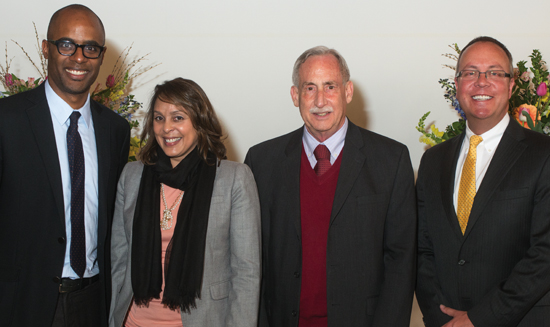




"The Pencil Portrait," photograph of Abraham Lincoln by Alexander Gardner, April 9, 1865. This war-weary portrait of Lincoln was taken on the day Confederate General Robert E. Lee surrendered at Appomattox, just four days before Lincoln's assassination at Ford's Theatre on April 14, 1865. Lincoln is holding a pencil, reportedly given to him by his son Tad for sharpening. The negative to the image was set aside and forgotten, until it was copyrighted and printed in 1894. Courtesy Lincoln Club of Delaware, Abraham Lincoln Collection, University of Delaware Library.
Marking the 150th anniversary of such a pivotal American document as the Emancipation Proclamation clearly seemed to require input from a large number of academic experts across a range of disciplines, said Anne Boylan, professor of history at the University of Delaware.
Fortunately, she said, the UD faculty has that kind of breadth and depth of specialization in a variety of subjects that relate to slavery, emancipation and the domestic and global legacies of both. As a result, the initial idea of organizing a symposium or hosting a few lectures expanded into a semester-long series of events, UD's Emancipation Semester, held during spring 2013.
"The University of Delaware has some renowned scholars on these subjects, not just historians but also experts in literature and public policy and other areas," said Boylan, who also is a professor of women and gender studies and who was instrumental in creating the Emancipation Semester. "When you look at this larger picture of scholarship that all fits together, we decided to bring it into a semester focusing on emancipation."
President Lincoln issued the Emancipation Proclamation on Jan. 1, 1863, as an executive order declaring that all slaves held in the Confederate states at war with the Union were freed. Because the proclamation didn't apply to border states like Delaware, for example, where slavery continued but which never seceded to join the Confederacy, it was in many ways only symbolic, said Leland Ware, UD's Louis L. Redding Chair and Professor for the Study of Law and Public Policy.
"But it was a very important symbol that may have turned the tide of the Civil War," Ware said in a talk at UD's Emancipation Symposium in April, one of the culminating events of the semester.
Other featured speakers at the symposium were UD faculty members Peter Kolchin, Henry Clay Reed Professor of History, and Jonathan Russ, associate professor of history.
Kolchin specializes in 19th-century U.S. history, the South, slavery and emancipation, and has written comparative histories of U.S. slavery and Russian serfdom. Throughout history, he said, "War frequently weakened slaveholder regimes," and that happened in the American Civil War as well.
"It increasingly became a war about slavery," Kolchin told the symposium audience. "If not for the Civil War, the United States might have outlasted Brazil" as the last Western nation to abolish the practice.
Russ, who specializes in the history of Delaware and of modern American business, spoke about the legacies of emancipation in 19th- and 20th-century Delaware. He began his talk by telling the audience, "Delaware is a peculiar place" that "plays a central role in the history of American emancipation."
Before the Civil War, he said, Delaware had Quaker and Methodist traditions that helped African Americans establish churches and community organizations, and the state remained loyal to the Union.
But, he noted, "Delaware was not at all progressive when it comes to race relations," with some 1,800 slaves held during the Civil War and not freed until the 13th Amendment—which the state never ratified until 1901—took effect nationwide in December 1865.
Events held earlier in the semester included the history department's regularly scheduled History Workshop series of presentations and a campuswide course, with weekly speakers, co-sponsored by the departments of Women and Gender Studies and of Black American Studies. The workshop series and the course were open to the public; both focused on the theme of emancipation and its many dimensions.

Speakers at UD's Emancipation Symposium included, from left, Brett Gadsden, a professor of African American studies at Emory University; Natasha Trethewey, U.S. poet laureate and Robert W. Woodruff Professor of English and Creative Writing at Emory; and UD professors Peter Kolchin and Jonathan Russ.
A small sampling of the UD experts who participated in one or both of the series were P. Gabrielle Foreman, Ned B. Allen Professor of English, whose lecture concerned the poetry written on clay vessels by a then-slave known as Dave the Potter; J. Ritchie Garrison, professor of history and director of UD's Winterthur Program in American Material Culture, who spoke about black regiments that fought in the Charleston, S.C., area during the Civil War; Adrian Lopez-Denis, assistant professor of history, who discussed the legacies of abolition in the Spanish Caribbean; and Arica Coleman, assistant professor of Black American Studies, whose talk was titled "Black Slavery and Emancipation in Indian Country."
Also during spring semester, the University of Delaware Library featured an exhibition, "Emancipation and Its Legacies," where visitors could view documents and materials from the Lincoln Collection in the library's Special Collections.